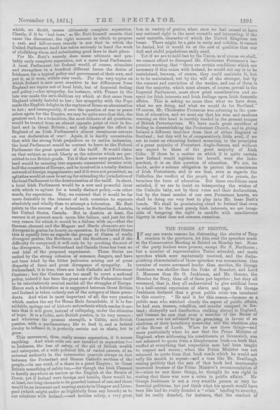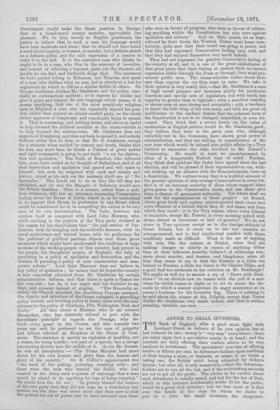THE TORIES AT BRISTOL.
IF any one wants reasons for distrusting the stories of Tory
I. reaction in the provinces, let him read the speeches made at the Conservative Meeting at Bristol on Monday last. None of the party leaders were present, except Sir S. Northcote ; but a number of representative Tories attended, and made speeches which were rapturously received, and the distin- guishing characteristic of those speeches was scrawniness. One member of course screamed louder than another, Sir George Jenkinson was 'shriller than the Duke of Beaufort, and Lord J. Manners than Sir G. Jenhinson, and Mr. Greene, the Member for Bury, than all of them put together ; but they all screamed, that is, they all endeavoured to give artificial force to a half-unreal expression of alarm and rage. Sir George Jenkinson declared that a great public crisis was imminent in this country. "He said it for this reason—because as a public man who watched closely the aspect of public affairs, he had seen treason, rebellion, and murder rampant in Ire- land ; disloyalty and disaffection stalking abroad in England, and because he saw that even a member of the House of Commons was not ashamed to go preaching in favour of an abolition of their hereditary monarchy, and the abolition also of the House of Lords. When he saw these things—and more particularly when he saw that the Prime Minister of England, when addressing his constituents at Greenwich, was not ashamed to quote from a blasphemous book—a book that scoffed at everything that respectable men had been taught to respect and revere ; when the Prime Minister was not ashamed to quote from that book words which he would not sully his mouth to repeat—and a man like Mr. Bradlaugh stating publicly that the sale of that book had enormously increased because of the Prime Minister's recommendation of it—when he saw these things, be thought he was right in stating that there was now a crisis in public affairs." Sir George Jenkinson is not a very sensible person or very in- fluential politician, but just think what his speech would have been like had he really dreaded a " crisis" tending to anarchy, had he really dreaded, for instance, that the conduct of
Government would make the finest position in Europe, that of a broad-acred county member, appreciably less pleasant. We do him, merely as English gentleman, the justice to believe that in such a case his language would have been moderate and stern ; that we should not have heard a word about impiety, or treason, or murder, but a definite attack on a definite policy, and the cold expression of a resolve to resist it to the last. It is the contented man who thinks he ought to be in a rage, who flies to the armoury of invective, and instead of selecting a bayonet, picks out the bluntest old javelin he can fin], and forthwith flings that. The sentences we have quoted belong to Eldonism, not Toryism, and speak of a man who dislikes what he sees, but is utterly at a loss for arguments by which to diffuse a similar dislike in others. Sir George Jenkinson dislikes Mr. Gladstone and his policy, espe- cially on ecclesiastical matters ; so to express his dislike and give it point and temper, he uses language which means, if it means anything, that one of the most sensitively religious men in England, a man who has repeatedly injured his posi- tion rather than conceal an almost morbid piety, on the whole rather approves of blasphemy, and consciously helps to spread it. That is screaming, and nothing better, and about as useful to help forward the political machine as the steam-whistle is to help forward the railway-train. Mr. Gladstone does not .approve of blasphemy, and does not help to spread it, and nobody 'believes either that he does, or that Sir G. Jenkinson, except "for a moment when excited by oratory and wrath, thinks that le does, any more than he thinks a Cabinet of great nobles and rigid economists is going to put forth "a cry for destruc- tion and spoliation." The Duke of Beaufort, who followed him, must have smiled as he thought of Badminton, and of all that destruction and spoliation had spared and will spare to himself ; but even he, weighted with rank and estates and history, raised as his only cry the uselessly shrill one of "No Surrender." The Lords are to do as they like till they are abolished, and he and the Marquis of Salisbury would save the Bristol charities. That is a scream, rather than a poli- tical utterance, still less an utterance expressing Conservative feeling about the House of Lords, which is, as we understand it, to support that House, in preference to any House which could be substituted for it, in compelling the nation to be very sure of its own determination. The Duke, however, was caution itself as compared with Lord John Manners, who, while exulting in the position of the Tory party, declared as the reason for his cheerfulness that "the past session of Par- liament, with its bungling and discreditable finances, with its "naval misfortunes and wasted hours, with its preference for -the paltriest of political partizan objects over those great measures which might have ameliorated the condition of large sections of the working-people of this country, had proved to the people, the thoughtful people, of England, the folly of persisting in a policy of spoliation and destruction, and the wisdom of pursuing a policy of wise construction and tem- perate reform." Lord John Manners does not believe in any policy of spoliation ; he means that he hopes the country is now somewhat alienated from Mr. Gladstone by certain administrativ.e failures, and that there is again a chance for his own side ; but he is too angry and too doubtful to say that, and screams instead of singing. "The Monarchy as- -sailed, the Church attacked, the hereditary Peerage menaced, the dignity and splendour of the Crown outraged, a grovelling policy abroad, and levelling policy at home, these were the sub- stitutes for the policy of Chatham, Pitt, Wellington, Peel, and Derby." All that about a Minister who is an avowed Monarchist, who has distinctly refused to part with the hereditary principle* as regards the Peerage, who de- 'fends every grant to the Crown, and who scarcely two 'years ago said he preferred to see the men of property and leisure selected as Members of the House of Com- mons, The sentence is merely an explosion of hostility, not a reason for being hostile ; not part of a speech, but a savage interjection thrown into the middle of it. As for Mr. Greene, he was all interjection :—" The Prime Minister had more desire for his own honour and glory than the honour and glory of his country." Sir R. Collier's appointment was "the work of the poking, pottering, sneaking tribe ; and these were the men who wanted the Ballot, who had created in the Army such a system of espionage that a man would be afraid to do anything for fear of being reported." He would kick the lot out ; "ho greatly blamed the leaders of his own party that they did not urge on a dissolution last session, for the time was never more ripe than now to kick the present lot out of power and to have returned men there
who were in favour of progress, who were in favour of reform- ing anything within the Constitution, but who were against spoliation and robbery." And so, their minds, let us hope, relieved by their hoots, the Western Tories went home com- fortably, quite sure that their world was going to pieces, and that they had expressed Conservative feeling very well, and that they had enjoyed themselves very much indeed. They had not expressed the genuine Conservative feeling of the country at all, and it is one of the great misfortunes of that great party that their feeling at present finds no correct expression either through the Press or through their most pro- minent public men. The steam-whistles rather shock their ears than express the cry they want to raise. We take it their opinion is very nearly this,—that Mr. Gladstone is a man of high moral purpose and immense ability for particular functions and special acts of legislation, but with much less capacity to govern than to legislate ; with a manifest inability to choose men at once strong and acceptable ; with a tendency to dread the Left wing of his own army, and with too great an indifference to the cardinal dogma that the external form of the Constitution is not to be changed, imperilled, or even dis- cussed. They think that a severe lesson on the value of moderation in English politics would do Mr. Gladstone good ; they believe they have in the party men who, although unluckily not in the Commons, have shown great power of administration, and they are willing, in consideration of the new tone which would be infused into public affairs by a Tory Cabinet to encounter the risks involved in Mr. Dieraeli's Premiership. He would at least be unembarrassed by allies of a dangerously Radical type of mind. Further, they think that opinions like theirs have spread since the last election, and will be pleased if their representatives can, with- out striking up an alliance with the Nonconformists, force on a dissolution. We venture to say that is a truthful account of the present opinions of nine average Conservatives in every ten, that is, of an immense majority of those whose support alone gives power to the Conservative chiefs, and can alone give them a chance of permanent authority. Yet where shall we seek for the representatives of these people At Bristol, where great lords and squires misinterpreted their views into mere effusions of a hatred which they do not share, and from which they recoil ; or in the Tory organs, where every Liberal of eminence, except Mr. Forster, is every morning pelted with abuse, almost as innocuous as hail on granite ? We do not share in Tory opinions except as to the foreign attitude of Great Britain, but it vexes us to see our enemies so misrepresented, and to find intellectual conflict with them needlessly made so difficult. What is the use of arguing with men like the orators at Bristol, when they are making charges so utterly in excess of anything either they or their followers heartily believe of criticizing non- sense about murder, and treason, and blasphemy, when all that they mean to say is that the Premier is a little too lenient to Fenians, a little too bland to Sir Charles Mike, and a good deal too moderate in his criticism on Mr. Bradlaugh ? We might as well try to answer a cry of "Down with Glad- stone 1" in an election row, to reason with the yell of a mob when its victim comes in sight, or to set to music the dis- cords by which a macaw expresses its angry annoyance at its owner's fondness for his favourite dog. There is nothing to be said about the seance at the Dolphin except that Tories dislike Mr. Gladstone very much indeed, and that is neither amusing, valuable, nor new.



































 Previous page
Previous page